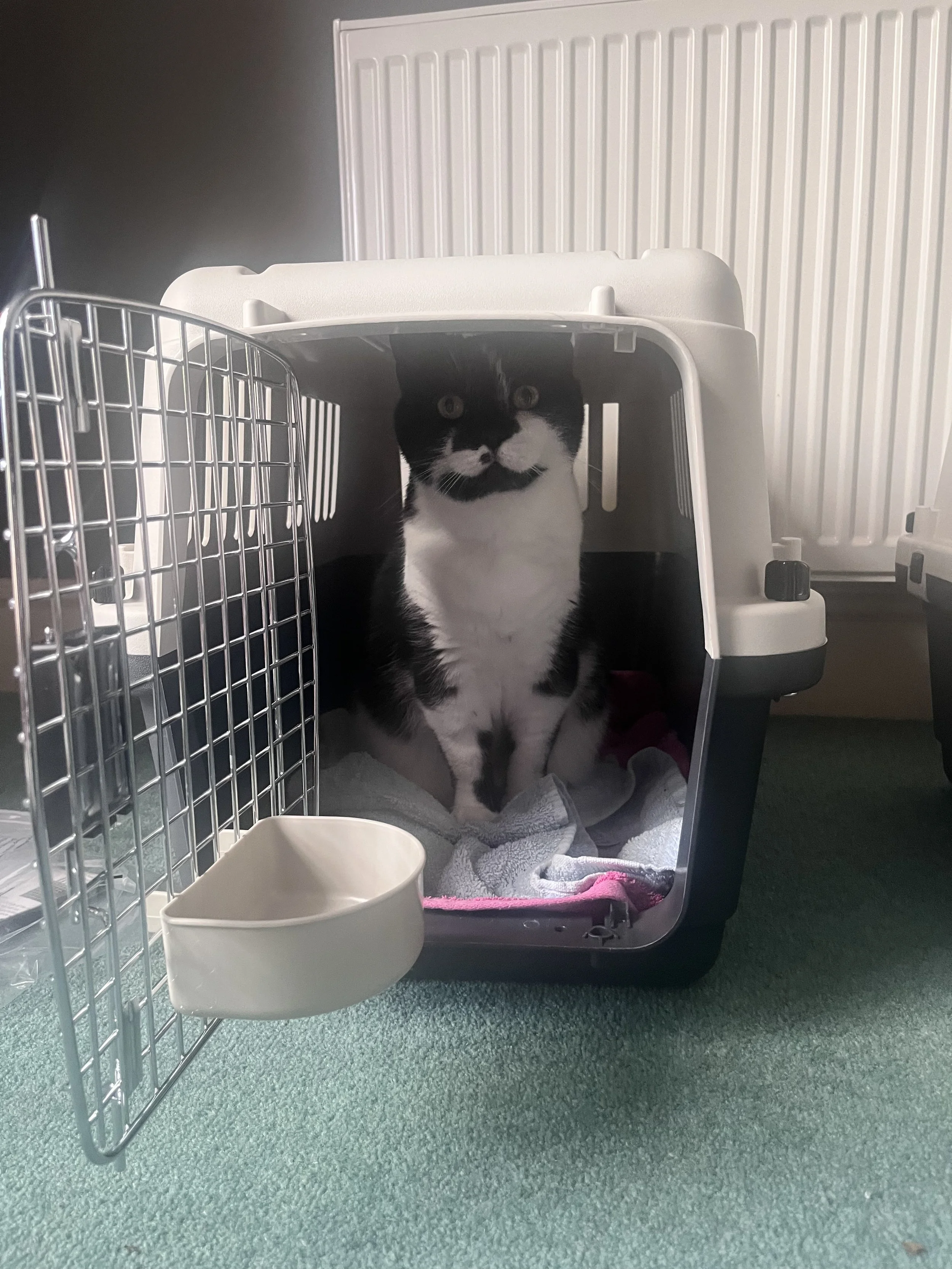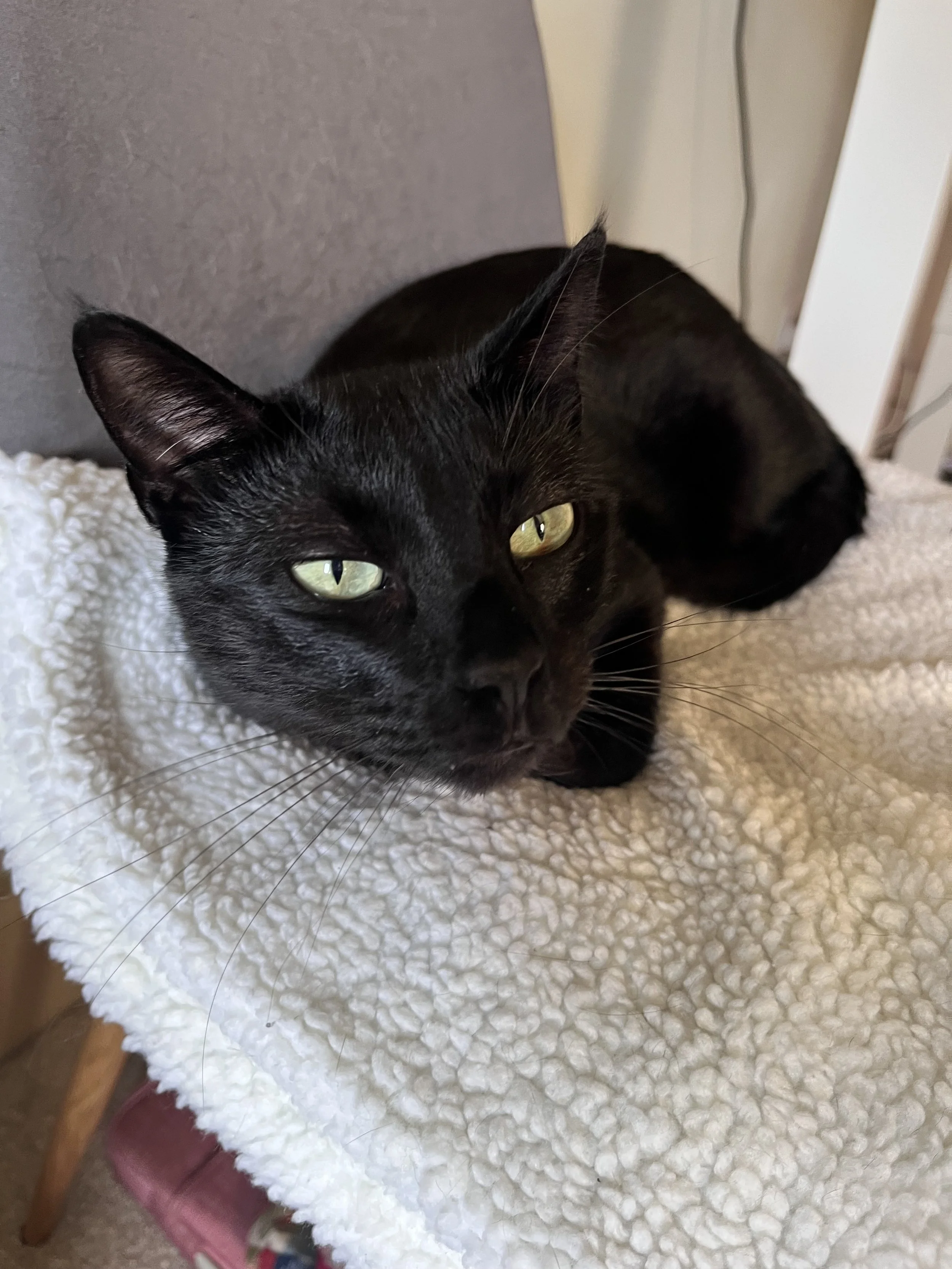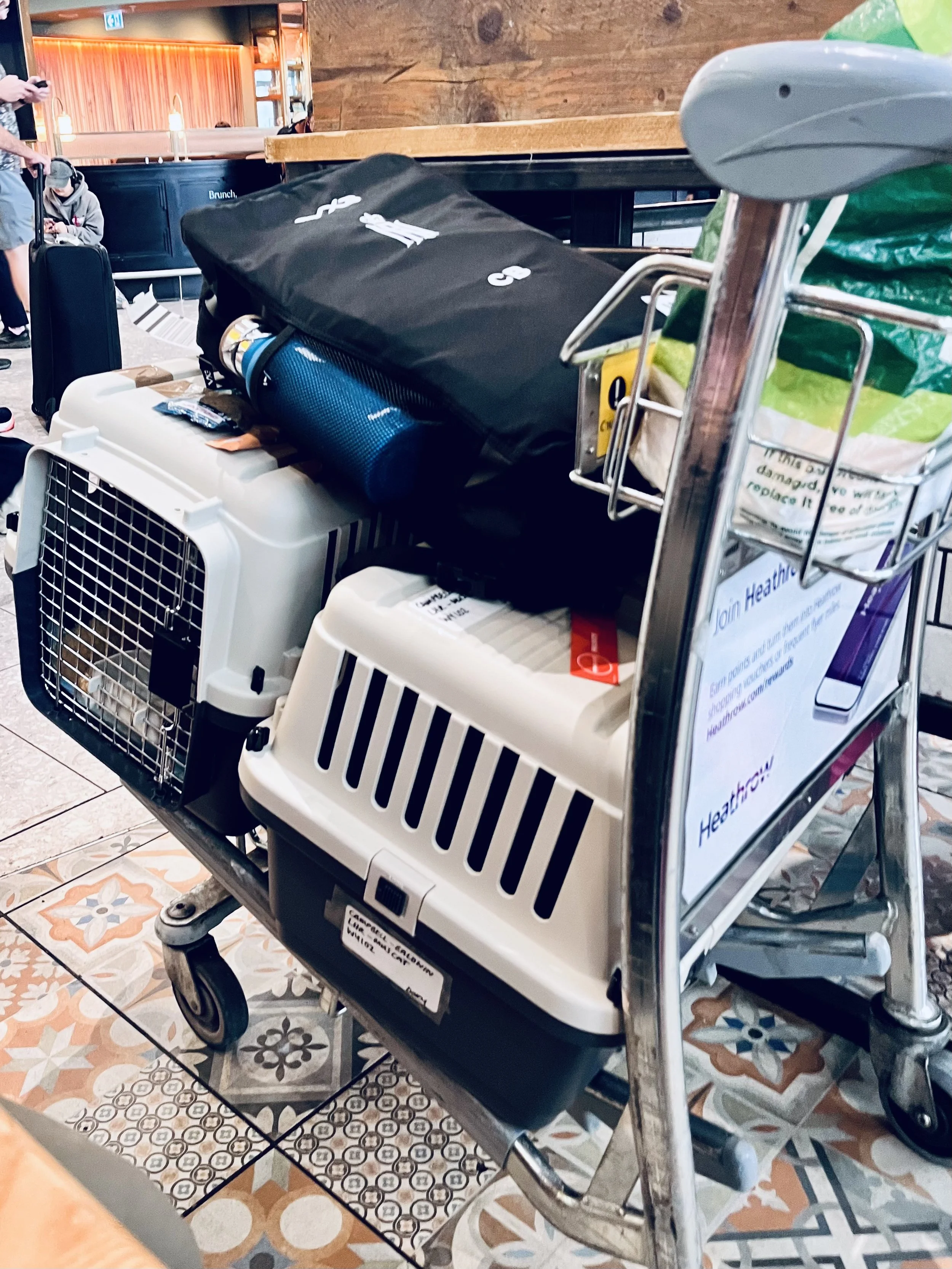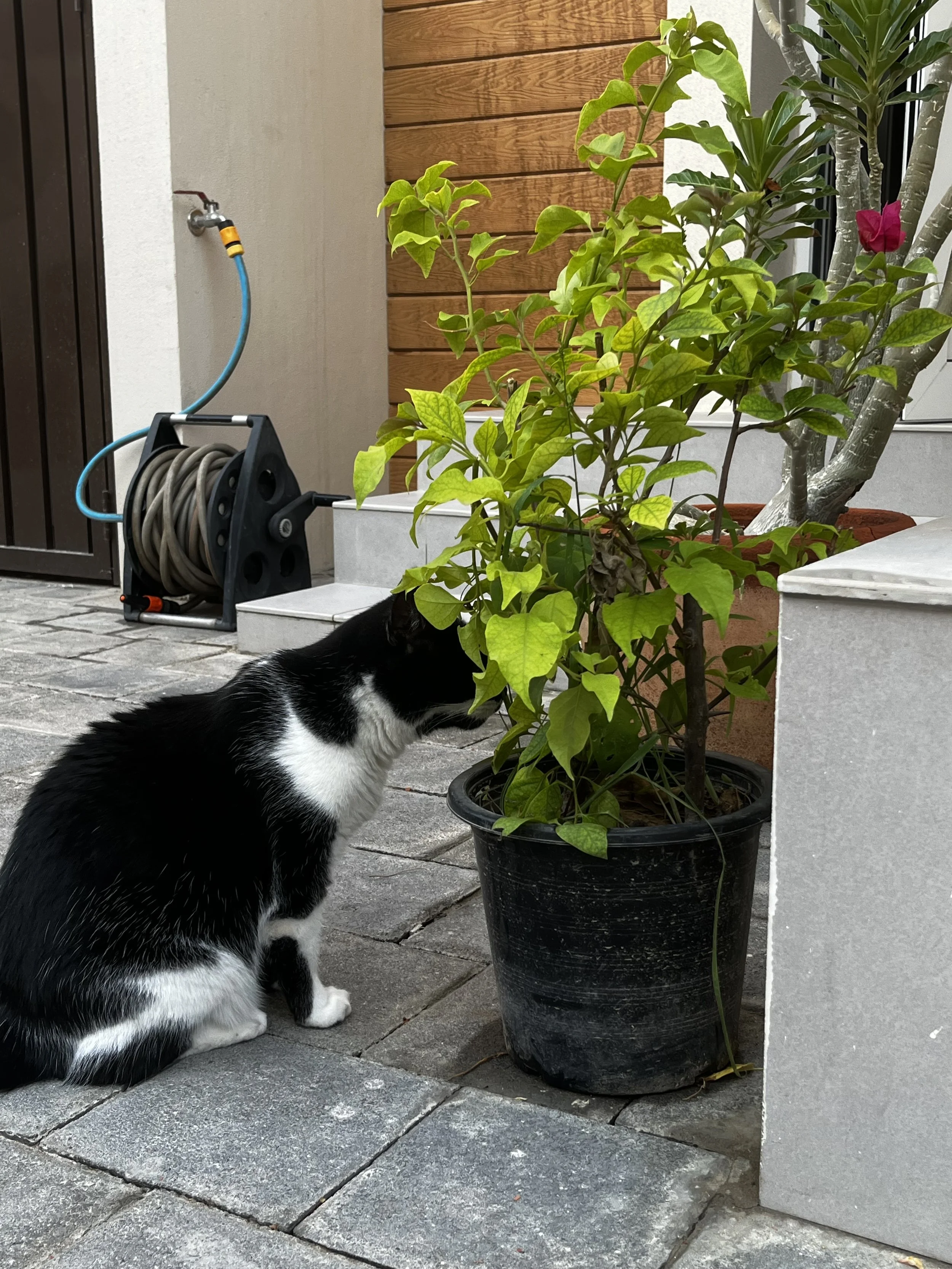Taking Pets to Oman
When you move abroad, there’s one question that worries you more than anything else: what about the pets?
When our family relocated from the UK to Muscat in August 2025, there was never any doubt that our two rescue cats, Flash, adopted in Portugal, and Dory, adopted in the UK, would come with us. They’re part of our family, and leaving them behind simply wasn’t an option.
Flash, our charming troublemaker, we rescued while living in Portugal, and Dory, our older lady, adopted in the UK, have been part of our family for the past four years. But working out how to move two cats halfway across the world turned out to be the hardest part of the entire relocation.
There were forms, vets, flight approvals, and more acronyms than I care to remember. But now that we’re settled in Oman, with both cats snoozing happily under the air conditioning, I can look back and say it was all worth it.
Here’s how it really went.
Finding Our Way Through the Paperwork Jungle
Unlike our household shipment, the cats weren’t covered by my husband’s company relocation package — so it was all down to us. Our local vet in the UK recommended PassPets, and they were fantastic from the start. Their Official Vet handled the final health checks, signed the export permit, and made sure our cats met all the DEFRA requirements for travel.
In Muscat, I found Al Qurum Vets through a late-night Google search — and they were a complete lifesaver. Everything was handled over email in English, and they replied within hours, clearly explaining each step. They even double-checked our microchip numbers and vaccination dates before applying for the Oman import permit, which made the process far smoother than I’d imagined.
What stressed me out most was the rabies vaccination timeline. Online guidance suggested cats couldn’t enter Oman until three months after a titration test, which would have meant delaying our move until autumn. Thankfully, Al Qurum confirmed that because the UK is rabies-free, that wait didn’t apply to us. Without their advice, Flash and Dory would have been stuck in the UK until October.
Tip: Start early if you can. Pet relocation can take several months to organise though in our case, we only had a few weeks!
Preparing the Cats for Travel
We only had confirmation of our move in April, and by August we were on a plane — not much time to prepare!
I bought two airline-approved pet crates from Amazon, carefully checking Oman Air’s requirements for size, materials, and ventilation. They looked huge in the living room at first, and I remember worrying about how the cats would handle such a long journey in them.
We lined the crates with three layers — vet bed, puppy pads, and an old towel — just in case. That decision turned out to be a stroke of genius, because minutes before takeoff, Flash decided to test the system by having an accident right there in Heathrow! A quick clean-up later and we were back on track — proof that a little over-preparation goes a long way.
At Heathrow, the check-in staff were wonderful. They carefully reviewed the paperwork, admired the cats, and promised to handle them gently. The cats stayed with us until about an hour before boarding, which helped keep them calm. I remember feeling anxious watching them disappear behind the gate, but there was something comforting in knowing they were on the same flight as us — not in a separate cargo hold somewhere far away.
The Flight and Arrival in Muscat
The flight itself was uneventful (for us, at least). When we landed in Muscat, the customs process took approximately one to two hours. The official Omani vet checked the cats and verified every document before we could collect them. When I finally saw those two crates coming through the arrivals area, I could’ve cried with relief. They were alert, meowing, and very ready to go home.
It was incredibly hot outside, but we’d parked as close as possible and had the air conditioning running full blast. Within half an hour, we were home, the cats out of their crates and exploring their new surroundings.
Paperwork & Process
Handled by PassPets (UK side):
Official vet completed final health checks
DEFRA export health certificate (EHC) issued and signed
Fit-to-fly veterinary certificate completed
Verified microchip and vaccination records
Checked airline-approved crate specifications
Handled by Al Qurum Vets (Oman side):
Applied for the Oman import permit (valid for 30 days)
Provided clear English-language instructions via email
Checked that all our documentation matched exactly (microchip numbers, vaccination dates, owner details)
Both companies were responsive and professional. Communication with Al Qurum Vets was particularly easy quick replies, clear explanations, and reassurance at every step.
Most confusing part was the rabies vaccination timing. Make sure your vet confirms which rules apply to your departure country before booking flights.
Flash and Dory waiting to board their first flight
Settling in to Their New Home
Flash adapted instantly — within minutes, he was eating, purring, and claiming every sunny windowsill as his own. Dory, on the other hand, took things at her own pace. For the first two days, she refused to come out from under the sofa except to eat when the house was quiet. We’d been warned that some cats take longer to settle after international travel, and it’s true. The key was letting her find her rhythm, keeping things calm, and sticking to familiar food and routines.
We registered with Al Qurum Vets soon after arriving, though thankfully, we haven’t needed to take them in yet. Just knowing they’re there for follow-ups gives me huge peace of mind.
Tip: Bring a small supply of your cat’s favourite food and litter — local options can be different, and familiar scents really help them adjust.
5. Arrival & Settling In
By the time we reached our new home, the cats were hungry — though they’d clearly been fed at some point during the journey. The Muscat heat hit us straight away, but thankfully our house was fully air-conditioned, and they quickly found cool corners to hide in.
Flash adjusted immediately, eating and exploring as though nothing had happened. Dory, however, spent about 48 hours hiding under the sofa, creeping out only to eat at night. Within a few days, both had settled and were back to their usual routines.
We’ve since registered with Al Qurum Vets for ongoing care, though we haven’t needed to visit yet. Knowing we have a trusted vet nearby gives huge peace of mind.
Tip: Bring a small supply of your cat’s favourite food and treats. Familiar tastes really help them settle in those first few days.
The Costs and What We Learned
Relocating pets isn’t cheap, but it’s completely doable if you plan well. The airline fee for Oman Air was surprisingly reasonable at about £250 per cat as excess baggage. The vet visits, vaccinations, paperwork, and import/export services added up, but every penny felt worthwhile once they were safely here. We briefly considered shipping them separately as cargo, but the cost was significantly higher. Travelling on the same flight worked perfectly for us.
If I could change one thing, I’d start crate training earlier. The cats were used to carriers, but not to being enclosed for such a long time. A few practice sessions before the move might have helped.
Item Estimated Cost (GBP)
Airline pet fee (Oman Air, per cat) £250
Vet checks, vaccinations & paperwork £300–£400
IATA travel crates £100 total
Al Qurum Vets import permit £150–£200
PassPets export support £300–£400
Total estimate: around £1,000–£1,200 for two cats — far less than using a full-service shipping company.
Best advice: Always check with vets in Oman before finalising travel dates. Without Al Qurum’s guidance, we’d have delayed our move unnecessarily.
Looking Back
Now that we’re here, watching Flash and Dory nap under the cool air of the Muscat afternoon, I can honestly say the stress was worth it. They’ve adapted beautifully, and the house wouldn’t feel like home without them.
If you’re planning to move your pets abroad, especially to somewhere as warm and welcoming as Oman, know that it’s entirely possible with the right support and preparation.
You’ll worry, you’ll double-check every document, and you’ll probably overpack puppy pads. But when you finally open those crates and see those familiar little faces in your new home, you’ll know you made the right choice.



